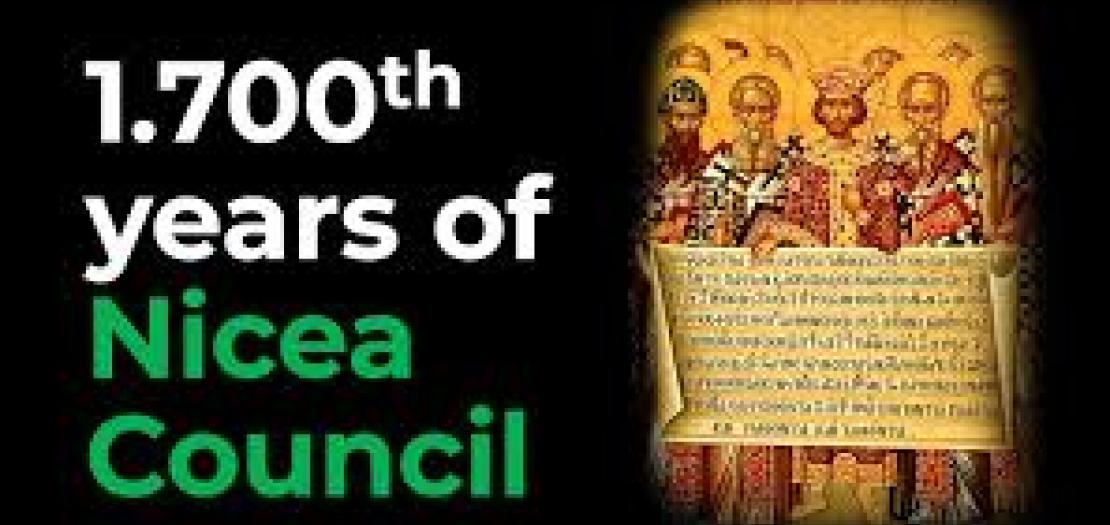Issued by the Catholic Center for Studies and Media - Jordan. Editor-in-chief Fr. Rif'at Bader - موقع أبونا abouna.org
Between Nicaea 325 and Nicaea 2025… a new hope emerges exuding goodness
May 20, 2025 marked the 1,700th anniversary of the time when the Council of Nicaea convened which gave us the Nicene Creed. Marking the anniversary, His Holiness Pope Leo XIV said during his recent meeting with representatives of other Churches, “My election has taken place during the year of the 1,700th anniversary of the First Ecumenical Council of Nicaea. That Council represents a milestone in the formulation of the Creed shared by all Churches and Ecclesial Communities. While we are on the journey to re-establishing full communion among all Christians, we recognize that this unity can only be unity in faith. As Bishop of Rome, I consider one of my priorities to be that of seeking the re-establishment of full and visible communion among all those who profess the same faith in God the Father, the Son and the Holy Spirit."
Actually, this anniversary of the First Ecumenical Council of Nicaea is quite important because it was held at a time when Christianity was united, namely prior to the Schism of 1054.
Reflecting on Christian unity, Pope Leo said, “Indeed, unity has always been a constant concern of mine, as witnessed by the motto I chose for my episcopal ministry: In Illo uno unum, an expression of Saint Augustine of Hippo that reminds us how we too, although we are many, “in the One — that is Christ — we are one”.
Ecumenical Patriarch of Constantinople Bartholomew I and His Holiness Pope Leo XIV have agreed to meet together in Nicaea toward the end of November 2025, near the Feast of Saint Andrew, in order to commemorate together the 1,700th anniversary of the First Ecumenical Council, which took place in 325.
With Nicaea marking the first time that the Church’s unity and mission were expressed at a universal level in a synodal form, it is hoped that as the Creed has all the time manifested unity, the meeting would be momentous to bring about unity and cement a firm Christian unity because “so in Christ we, though many, form one body,” (Romans 12:5)
On the other hand, reflecting on Nicaea 2025, His Beatitude Cardinal Pierbattista Pizzaballa says, “But even in all our smallness, Nicaea has remained an indispensable reference for everyone to this day. Orthodox churches, Catholics, Anglicans, Protestants... every Christian, regardless of which church they belong to, cannot avoid coming to terms with what the bishops of the Church of 1,700 years ago were able to work out, certainly under the action of the Holy Spirit.”
It is very important at this stage to exert efforts in the direction of standardization of the dates marking the Feast of Resurrection (Easter) and Christmas so that these two divine feasts may be celebrated by Christians worldwide on the same date. Furthermore, it is important to take exigent measures designed to stop Christian hemorrhage from the Middle East and help put an end to the systematic persecution being conducted against Christians and Christian institutions in various parts of the world, particularly in Nicaragua. Taking measures to confront these challenges will provide healthy atmospheres leading to Christian unity.
It is important to note in this regard to refer to the statement made by Patriarch of Baghdad of the Chaldeans Cardinal Louis Raphael Sako who asserted on September 19, 2022 the need for "unity among Churches to maintain the survival of Christians in the Middle East". It is also important to indicate that the Catholic Church had earlier embarked on Christian unity with the establishment of the Pontifical Council for Promoting Christian Unity, whose origins are associated with the Second Vatican Council which met intermittently from 1962 to 1965. It is a pontifical council whose main objections are designed to develop dialogue and collaboration with the other Churches and world communions, in addition to promoting within the Catholic Church an authentic ecumenical spirit.
With regards to efforts to bring about Christian unity, the late Pope Francis and the Ecumenical Patriarch, Bartholomew I, held private talks in 2014 in Jerusalem and signed a Common Declaration in which they pledged to continue on the path towards unity between the Catholic and Orthodox Churches. Furthermore, Pope Francis and Patriarch Kirill, patriarch of the Russian Orthodox Church, in February 2016, issued the joint declaration known as the Havana Declaration in which they expressed their hope that the meeting might contribute to the re-establishment of Christian unity between the two churches.


